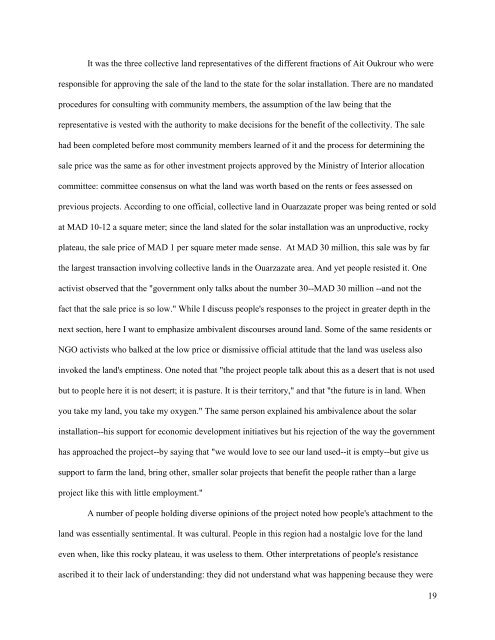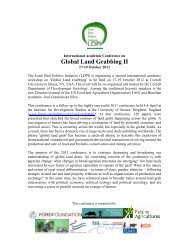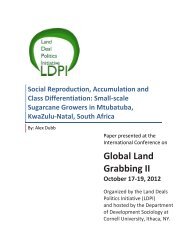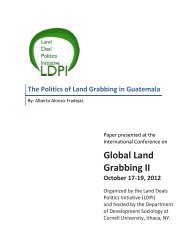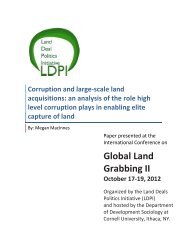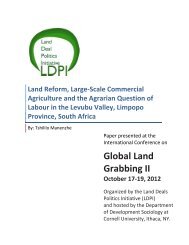Theorizing Sovereignty in Empty Land - Contested Global Landscapes
Theorizing Sovereignty in Empty Land - Contested Global Landscapes
Theorizing Sovereignty in Empty Land - Contested Global Landscapes
- No tags were found...
You also want an ePaper? Increase the reach of your titles
YUMPU automatically turns print PDFs into web optimized ePapers that Google loves.
It was the three collective land representatives of the different fractions of Ait Oukrour who were<br />
responsible for approv<strong>in</strong>g the sale of the land to the state for the solar <strong>in</strong>stallation. There are no mandated<br />
procedures for consult<strong>in</strong>g with community members, the assumption of the law be<strong>in</strong>g that the<br />
representative is vested with the authority to make decisions for the benefit of the collectivity. The sale<br />
had been completed before most community members learned of it and the process for determ<strong>in</strong><strong>in</strong>g the<br />
sale price was the same as for other <strong>in</strong>vestment projects approved by the M<strong>in</strong>istry of Interior allocation<br />
committee: committee consensus on what the land was worth based on the rents or fees assessed on<br />
previous projects. Accord<strong>in</strong>g to one official, collective land <strong>in</strong> Ouarzazate proper was be<strong>in</strong>g rented or sold<br />
at MAD 10-12 a square meter; s<strong>in</strong>ce the land slated for the solar <strong>in</strong>stallation was an unproductive, rocky<br />
plateau, the sale price of MAD 1 per square meter made sense. At MAD 30 million, this sale was by far<br />
the largest transaction <strong>in</strong>volv<strong>in</strong>g collective lands <strong>in</strong> the Ouarzazate area. And yet people resisted it. One<br />
activist observed that the "government only talks about the number 30--MAD 30 million --and not the<br />
fact that the sale price is so low." While I discuss people's responses to the project <strong>in</strong> greater depth <strong>in</strong> the<br />
next section, here I want to emphasize ambivalent discourses around land. Some of the same residents or<br />
NGO activists who balked at the low price or dismissive official attitude that the land was useless also<br />
<strong>in</strong>voked the land's empt<strong>in</strong>ess. One noted that "the project people talk about this as a desert that is not used<br />
but to people here it is not desert; it is pasture. It is their territory," and that "the future is <strong>in</strong> land. When<br />
you take my land, you take my oxygen." The same person expla<strong>in</strong>ed his ambivalence about the solar<br />
<strong>in</strong>stallation--his support for economic development <strong>in</strong>itiatives but his rejection of the way the government<br />
has approached the project--by say<strong>in</strong>g that "we would love to see our land used--it is empty--but give us<br />
support to farm the land, br<strong>in</strong>g other, smaller solar projects that benefit the people rather than a large<br />
project like this with little employment."<br />
A number of people hold<strong>in</strong>g diverse op<strong>in</strong>ions of the project noted how people's attachment to the<br />
land was essentially sentimental. It was cultural. People <strong>in</strong> this region had a nostalgic love for the land<br />
even when, like this rocky plateau, it was useless to them. Other <strong>in</strong>terpretations of people's resistance<br />
ascribed it to their lack of understand<strong>in</strong>g: they did not understand what was happen<strong>in</strong>g because they were<br />
19


